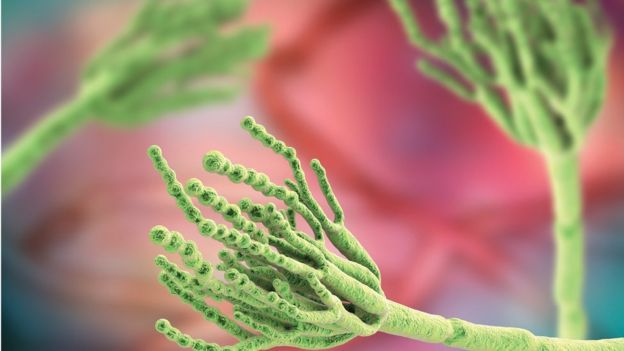The secret life of fungi: Ten fascinating facts
 Sept. 12: They’re all around us, in the soil, our bodies, and the air, but are often too small to be seen with the naked eye.
Sept. 12: They’re all around us, in the soil, our bodies, and the air, but are often too small to be seen with the naked eye.
They provide medicines and food, but also wreak havoc by causing plant and animal diseases.
According to the first big assessment of the state of the world’s fungi, the fungi kingdom is vital to life on Earth.
Yet, more than 90% of the estimated 3.8 million fungi in the world are currently unknown to science.
“It’s such an interesting set of organisms and we really know so little about them,” says Prof Kathy Willis, director of science at the Royal Botanic Gardens, Kew, which lead the report.
“They’re really weird organisms with the most bizarre life cycle. And yet when you understand their role in the Earth’s ecosystem, you realise that they underpin life on Earth.”
Many people are familiar with edible mushrooms or the mould behind penicillin. But fungi have a range of vital roles, from helping plants draw water and nutrients from the soil to medicines that can lower blood cholesterol or enable organ transplants.
Fungi also hold promise for breaking down plastics and generating new types of biofuels. But they have a darker side; devastating trees, crops and other plants across the world, and wiping out animals such amphibians.
Jekyll and Hyde
Dr Ester Gaya, who leads a research project at Kew exploring the diversity and evolution of the world’s fungi, says fungi a bit like Dr Jekyll and Mr Hyde.
“They can be good and also bad at the same time,” she says. “The same fungus, it can be seen as a detrimental thing – it can be bad – but also can have a lot of potential and have a lot of solutions.”
The report sheds light on a number of gaps in our knowledge of a group of organisms that may hold the answers to food security. The fungal kingdom contains some of the most damaging crop pathogens. But fungi also recycle nutrients and play a role in the regulation of carbon dioxide levels.
“We ignore fungi at our peril,” says Prof Willis. “This is a kingdom we have to start to take seriously, especially with climate change and all the other challenges that we’re being faced with.”
Fascinating facts about fungi
- Fungi are in a kingdom of their own, but are closer to animals than plants
- They have chemicals in their cell walls shared with lobsters and crabs
- A fungus has been discovered capable of breaking down plastics in weeks rather than years
- There is evidence to suggest that yeasts – a type of fungus – were being used to produce the alcoholic drink mead as long ago as 9,000 years ago
- At least 350 species are consumed as foods, including truffles, which can sell for thousands of dollars a piece, quorn, and those in marmite and cheese
- Plastic car parts, synthetic rubber and lego are made using itaconic acid derived from a fungus
- 216 species of fungi are thought to be hallucinogenic
- Fungi are being used to turn crop waste into bioethanol
- Products made from fungi can be used as replacements for polystyrene foam, leather and building materials
- DNA studies show that there are thousands of different fungi in a single sample of soil, many of which are unknown and hidden – so-called “dark taxa”.
- The report, State of the World’s Fungi, involved over 100 scientists from 18 countries. It found:
Over 2,000 new fungi are discovered each year, from a variety of sources, including a human finger nail
Hundreds of species are collected and eaten as food, with the global market for edible mushrooms worth £32.5bn a year
Only 56 types of fungi have been evaluated for the IUCN Red List, compared with more than 25,000 plants and 68,000 animals.
At the last count, there were at least 15,000 types of fungi in the UK, some of which could be on the edge of extinction.
Citizen scientists are helping to identify fungi across the country, adding to a database of more than 1,000 new records.
Dr Brian Douglas of The Lost and Found Fungi Project says fungi are as beautiful as orchids and just as important to protect. “I think we need to teach people, invite people in to admiring fungi.”
Colleague Dr Oliver Ellingham adds. “Fungi is a whole another kingdom equal if not greater than in diversity than both the plants and animals.”bbc.com
